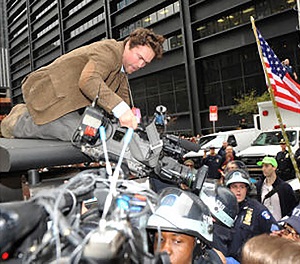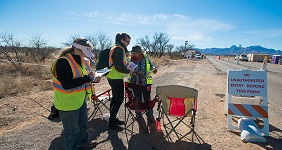In high-profile pro bono cases around the country, lawyers from multiple DWT offices have successfully upheld the right of citizens and the media to record law enforcement activity in public places.
Maryland
In early 2017, a DWT team led by Robert Corn-Revere and Ronald London helped freelance photojournalist Mannie Garcia win a settlement for $45,000 and changes in police department policy in a civil rights lawsuit resulting from his unlawful arrest by Montgomery County, Maryland, police in 2011. Mr. Garcia was arrested while photographing police officers responding to a call on a public street in Wheaton. Mr. Garcia claimed the officers confiscated the video card from his camera, put him in a chokehold, and repeatedly knocked him to the ground.
Mr. Garcia was acquitted of disorderly conduct about six months later, but during that time had his White House credentials suspended because he had been charged with a crime, impeding his ability to work. Represented by DWT, with support from the National Press Photographers Association (NPPA), Mr. Garcia filed suit in 2012, alleging violations of his First and Fourth Amendment rights and various common-law claims. The Justice Department, under then-Attorney General Eric Holder, filed a brief in support of the photographer.
Years later, the case settled with a monetary award to Mr. Garcia and with the Montgomery County Police Department agreeing to train its officers and change its policies regarding contacts with photojournalists.
An award of legal fees and costs is still to be decided by the court and could be well into six figures.
Said Mickey H. Osterreicher, general counsel at NPPA: “Mannie and his lawyers should be commended for vigorously pursuing this case. It is unfortunate that another law enforcement agency had to learn the hard way to respect the Constitution at taxpayers’ expense.”
Oregon
In Oregon, Alan Galloway and Tim Cunningham, together with the American Civil Liberties Union (ACLU), achieved a settlement in which the cities of Portland and Gresham agreed to institute new police policies and training, and to pay our client—whose phone was seized while live-streaming treatment of a suspect in custody—$85,000 in legal fees.
Carrie Medina is a citizen journalist who was on her way home from her job at Oregon Health & Science University when she saw police tackle a young man at a transit stop in downtown Portland. Several minutes after she took out her phone and started to record, she was confronted by an officer who wanted to see her video. When she refused to let the officer see the video without a warrant, he grabbed the phone from her and twisted her arm. The officer was working on a transit police detail, which includes police from Portland and Gresham. DWT lawyers sued on her behalf in 2015, claiming violations of her First and Fourth Amendment rights.
“Carrie wholeheartedly believes in the power of filming the police as a tool to increase accountability,” said Alan. “She was clear that she wanted her case to bring about policy changes to protect the right to film police, not monetary damages. Although the settlement took a lot of time and effort to reach, the resulting policies and training clearly recognize the constitutional right to film the police.”
Funds from the settlement went to the ACLU Foundation of Oregon.
New York On Nov. 15, 2011, veteran camera operator Douglas Higginbotham was on assignment for Television New Zealand, filming clashes between police officers and Occupy Wall Street protesters in downtown New York City. After Mr. Higginbotham climbed atop a phone booth to film events taking place below, he was ordered down by police, arrested, and charged with disorderly conduct.
On Nov. 15, 2011, veteran camera operator Douglas Higginbotham was on assignment for Television New Zealand, filming clashes between police officers and Occupy Wall Street protesters in downtown New York City. After Mr. Higginbotham climbed atop a phone booth to film events taking place below, he was ordered down by police, arrested, and charged with disorderly conduct.
The criminal charge was dismissed and Mr. Higginbotham subsequently brought a Section 1983 civil rights action against the arresting officers, alleging the arrest was in retaliation for his exercise of the First Amendment right to record police engaged in official conduct in public. The district court dismissed his claim on summary judgement, finding that the defendant officers had probable cause to arrest him. Mr. Higginbotham appealed that dismissal to the 2nd Circuit.
The NPPA’s Mickey Osterreicher enlisted DWT to submit an amici brief on the appeal. The March 2017 amici brief, which was drafted by a team of Rob Balin, Jack Browning, and Abigail Everdell, asked the federal appeals court to squarely hold that the press and public have a First Amendment right to record police activity in public places. While six other federal circuit courts have uniformly recognized the First Amendment right to record, the 2nd Circuit has not done so—despite the fact that the 2nd Circuit sits in New York City, the nation’s media capital.
“This absence of judicial guidance has created a climate of uncertainty in the Second Circuit that inhibits the ability of amici to meaningfully cover newsworthy events,” said the brief. “[U]ntil the Second Circuit affirmatively recognizes the right to record police activity in public places, officers who arrest or harass those seeking to record their official conduct will continue to evade liability under the qualified immunity that is available to public officials…”
More than 60 leading news organizations, media companies, and free speech groups joined the brief, including ABC, NBC, CBS, CNN, The Associated Press, Reuters, The New York Times, the New York Post, Dow Jones, Gannett, Hearst, National Public Radio, BuzzFeed, the Reporters Committee for Freedom of the Press, the National Press Club, the Electronic Frontier Foundation, PEN American Center, Reporters Without Borders, and the Media Law Resource Center.
One of the amici, the New York Daily News, wrote in an editorial: “While police can narrowly cordon off territory to prevent interference with their work or when public safety is at stake, they must not abuse that authority to shield themselves from scrutiny.”
A decision in the case is pending.
Arizona On behalf of the NPPA and the Center for Investigative Reporting, DWT filed an amicus brief in a lawsuit that challenges U.S. Customs and Border Protection’s practice of barring citizen monitors and protestors from entering an “enforcement zone” near an Arizona checkpoint.
On behalf of the NPPA and the Center for Investigative Reporting, DWT filed an amicus brief in a lawsuit that challenges U.S. Customs and Border Protection’s practice of barring citizen monitors and protestors from entering an “enforcement zone” near an Arizona checkpoint.
The brief calls on the 9th Circuit to reverse a lower court ruling and allow People Helping People, a nonprofit that provides humanitarian aid along the U.S.-Mexico border, to pursue claims its First Amendment rights were violated.
“Amici urge the court to make clear that the public and press have a clearly established First Amendment right to access and record police activity in traditionally-public places such as Arivaca Road,” said the brief, which was authored by Rochelle Wilcox, Taylor Ball, and John Parsi.
“Although the public street at issue, Arivaca Road, is a thoroughfare, freely accessible to anyone traveling between two Arizona towns, the Government Defendants have used an expansive ‘enforcement zone’ to thwart any attempts by Plaintiffs or other citizen activists to monitor the conduct of Government officials at the checkpoint erected on that road,” said the brief. “If the Government Defendants’ overreach is allowed to stand, Amici and their members will be harmed as their constitutional rights are chipped away by an increasingly aggressive and secretive federal government.”
Arguments in the case were heard in December 2017.
